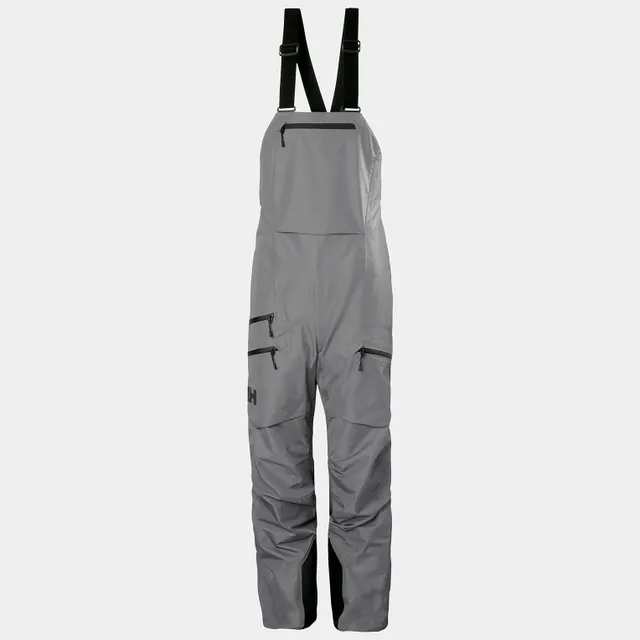Up to 50% Clearance Clothing & Footwear + Extra 25% Off REI Outlet.
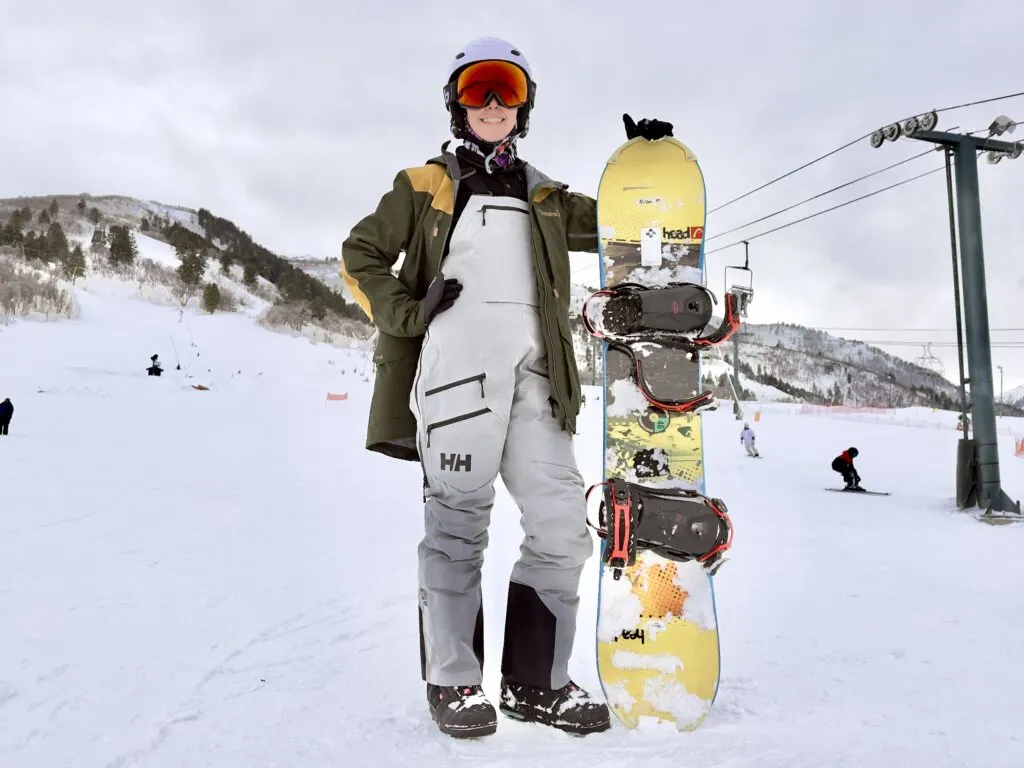
The minute I donned my crisp new bibs and jacket, I knew they were gonna rock. The materials were top notch, they left room for layering, and daaaang, they looked good. Plus: the pockets! But it wasn’t until after hours of skiing in below-freezing temps that I realized just how awesome this new kit was. So yes, as we near the end of the season, I finally found my favorite new sustainable ski kit. Here’s what it’s so rad, from fit and functionality to sustainability and fascinating material technology.
Helly Hansen Elevation Infinity Shell Bib Pant
Honestly, I was pretty certain I would hate bibs. To the point I wasn’t even going to test a pair. I mean, just the thought of going to the bathroom in bibs when you’re all layered up made me physically angry. But when a fellow snowboarder with more experience than me said she actually preferred them, I decided to take a closer look. And when I noticed these in particular had a huge zipper down the side that (supposedly) made it possible to go without completely disrobing, I decided to give them a try. (There are also pants available.)
And when they showed up at my door, I gotta say, I was impressed. The material was durable, they had numerous zippered pockets (4 total), they were easy to get on and off, and they fit beautifully over a pair of cozy Houdini fleece Long Power Tights and my beloved insulated Big Agnes Camp Boss pants (the bibs aren’t insulated). And when I went to the bathroom to test out the female-friendly functionality, it actually worked! Even with all those layers on, I could unzip that long size zipper and go without difficulty! (FYI: the men’s version has a zipper-fly and the pockets are set up a bit differently.)
There are also a total of two big vents on the sides and four pockets: one big one on the chest (which is better for soft items; a phone made it hard to crouch to clip into a snowboard), two on the right thigh (one shallow and good for lip balm and lift passes, one deep and expandable), and one big one on the left thigh. Bonus: there’s Recco tech (emergency locator technology) built-in.
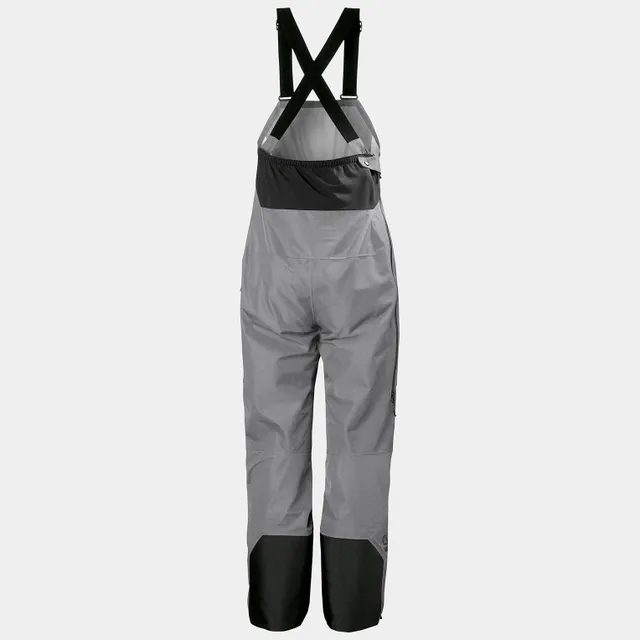
The pants feel ultra durable and have reinforced material on the inside of the leg for extra abrasion resistance. I wore an XS, which fit my upper body perfectly but still left plenty of room for layering in the legs. As a bonus, Helly Hansen has a long-running Ski Free promo where if you buy a participating product, you also get a free lift ticket to a participating resort (and yes, these bibs are a participating product)!
On the mountain, I never worried about snow going up my jacket and into my pants (thanks in part also to the shell–but we’ll get to that) or misplacing anything I dropped in the pockets or my pants sagging. All great, because as a new boarder, the only thing I want to focus on is my form…and not falling. I don’t want to constantly be hiking up my pants. Plus, as far as sustainability goes, these bibs are made out of Helly Hansen’s baller Lifa Infinity Pro material, which isn’t cheap, but is more sustainable.

What Makes Lifa Infinity Pro More Sustainable?
The main feature that makes the Infinity bib pant more sustainable is the material it’s made of: Helly Hansen’s Lifa Infinity Pro. Basically, it contains a super durable and waterproof membrane that remains waterproof for life thanks to innovative material technology and manufacturing. That’s because instead of using chemicals to waterproof the fabric, the super innovative polypropylene material is repeatedly heated, stretched and folded to create a waterproof but breathable material that is layered with a naturally hydrophobic outer material.
The result? Fabric that never loses water repellency and you never has to be re-treated. That also means there are no PFAS (There is a PFC-free treatment on the outer fabric) but it’s still waterproof, windproof, breathable, and super durable, which means it will last for many, many seasons to come.
Elevation Infinity Bib Pant Sustainability
These bibs are solution dyed, PFC-free, and will never need a re-waterproofing treatment, plus are 100% polypropylene, which may make them easier to recycle at the end of their usable life.
Other Sustainable Ski Clothing with Lifa Infinity Pro technology.
- Odin 9 Worlds Infinity Shell Jacket
- Odin 9 Worlds Infinity Shell Pants
- Odin Mountain Infinity 3-Layer Bibs
- Odin Infinity Insulated Jacket
- Elevation Infinity Ski Shell Jacket
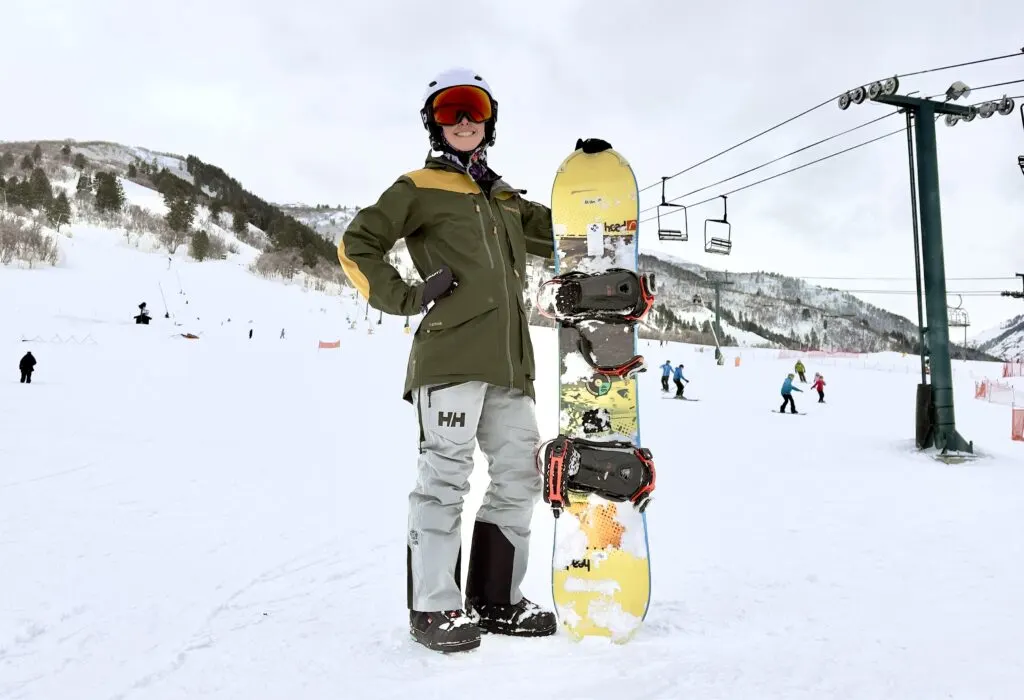
Norrona Tamok
When I first tried on this shell jacket (it’s not insulated, which is what I prefer), I was on the fence about it. Sure the fabric was top-of-the-line (more on the specifics below) and everything seemed super well designed, but it seemed very long for a ski jacket, especially thanks to the extra-long drop hem in the back of the women’s version (which is outfitted with a bungee for cinching). But it didn’t take long for me to warm up to it.
For starters, that ultra-long drop hem meant my butt was extra protected from cold and wet on chair lifts and when I fell (which was often) while practicing my turns. Plus, it looks super sleek on aprés-ski outings around town.
But more importantly, this jacket has so many useful features to keep you dry, comfortable, and your stuff safe and close at hand. For starters, it has two two-way pit vents to dump excess heat if you’re wearing it for high-output activities like uphill skinning or snowshoeing. There’s also a vent on the chest. There are 5 total pockets, including two huge front pockets with flaps, a chest pocket, an internal chest pocket, and a zippered arm pocket, which means there’s plenty of space to store gloves, lift tickets, lip balm, sunscreen, your phone, emergency locators, you name it.
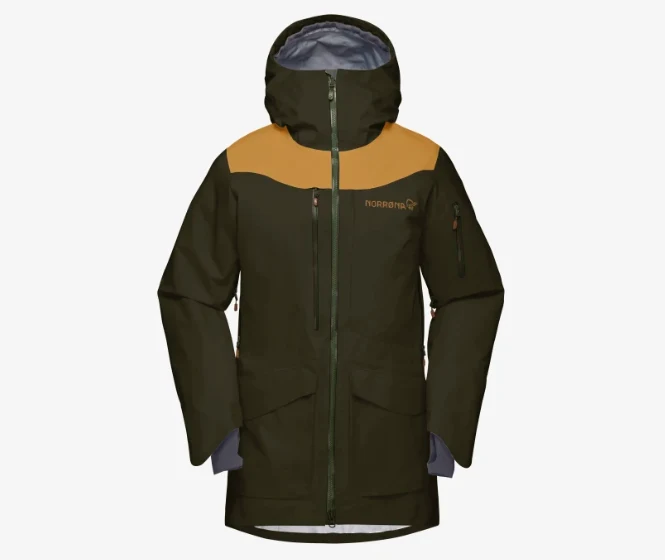
And of course there’s a powder skirt, which, when paired with the bibs above, left no chance for snow to get in practically anywhere (though the way I wipe out, I’m sure I could find a way to get some in the neck…).
The only ding I’ll give this jacket is that the hood was pretty snug over a helmet. It fit, but made head rotation difficult, so I wouldn’t necessarily recommend actively skiing or boarding with it up. I did love the bungee in the hood, though: one cord cinches it down and back, so if you’re wearing it without a helmet, say to go snowshoeing or on a rainy hike, you can really dial in the fit.
Same goes for the wrist cuffs. They have built-in gaiters with thumb holes that may be the most brilliant invention on a ski jacket since the powder skirt. They allow you to pull gloves over them to really keep snow out of your sleeves. On top of that, the cuffs are nice and roomy to go over glove cuffs, but can also be cinched down nice and snug (thanks to hook-and-loop strips) if you prefer for your gloves to be over your sleeves (ya freak). Just another way the jacket practically ensures you won’t get cold snow where it doesn’t belong.
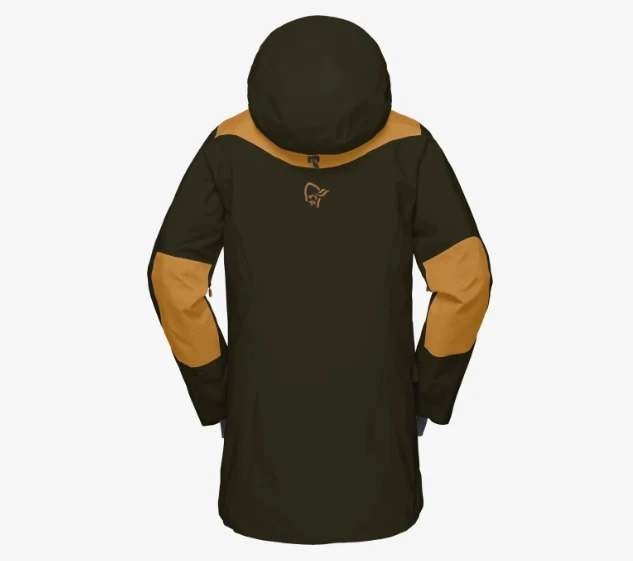
On top of all that, the jacket is tolerably lightweight, extremely well-equipped, and I wasn’t worried about getting soggy during a long hike up the mountains when snow started to fall and the wind started to blow. Speaking of materials, the Norrona Tamok is made of a relatively new material from GORE-TEX: ePE.
Is GORE-TEX ePE More Sustainable?
So what’s the deal with GORE-TEX’s new ePE membrane? Is it really more sustainable? In short: yeah, yeah it is.
GORE-TEX has long been known as the top-of-the line when it comes to waterproofing and DWR in outdoor gear. But that success has come at a price. Namely, the presence of PFAS in their waterproofing agents (read more about PFAS in this post or listen to our friend Meghan’s podcast series on the subject over at the Outdoor Minimalist Podcast). But basically, PFAS are bad; for human health and the environment. But American brands (and some international brands) have been continuing to use traditional GORE-TEX because they say they want to offer the best.
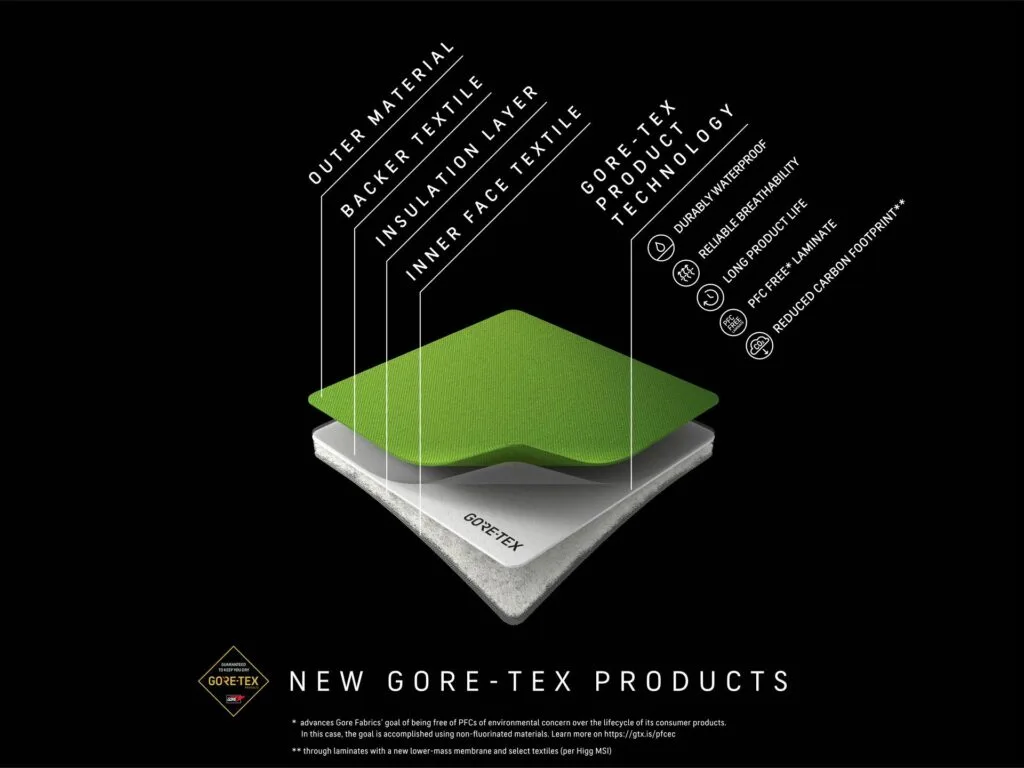
But GORE recently released a new ePE membrane (which stands for “expanded polyethylene”) completely free from PFAS. It first showed up in a few products in fall of 2022, but this winter (’23) many more brands offered products that use the tech (many of which are listed at the bottom of this post). And so far, reviews have been good.
Which is great, because not only are PFAS currently being banned across the world, but the new tech also resulted in less material mass and a 21% lighter carbon footprint in products like jackets when compared to the traditional GORE membrane. That said, that data compares the traditional membrane used with virgin materials and traditional dying methods to the new membrane paired with recycled materials and more sustainable solution dying methods, so it’s hard to say how much of that reduction is due to other factors and how much is due to the ePE membrane. Graphs make it look like the membrane itself is maybe just a bit over half of the whole 21% (see the graph below for a visual). I mean, any reduced footprint is good, but the statements may be slightly over-selling the technology.
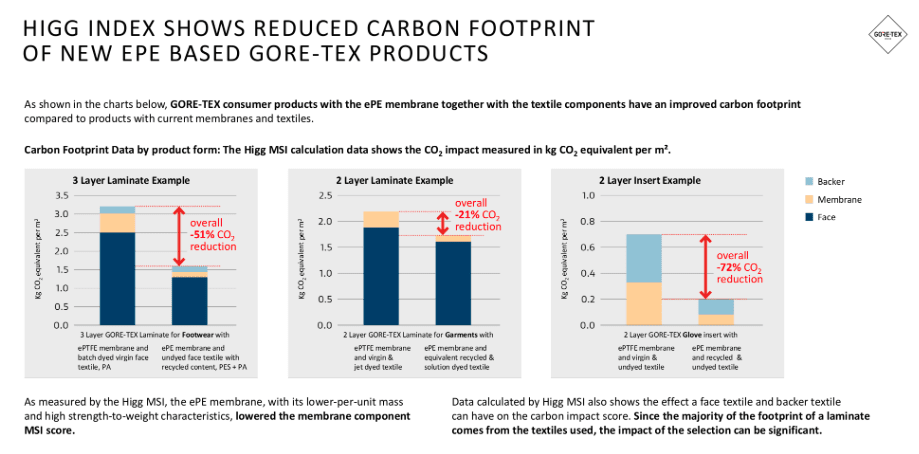
The new membrane is designed to be durable, though time will tell. Do keep in mind that it may need laundered more often than outerwear WITH PFC’s. And if you’re looking for “ePE” in product descriptions, don’t. GORE-TEX apparently doesn’t want it too apparent that the membrane is different and new. What you can look for in listings are a combo of “GORE-TEX” and “PFC-free.”
Tamok Sustainability
The Norrona Tamok is PFC-free, contains recycled materials, is made with Bluesign approved and Oeko-Tex certified fabrics.
Other Sustainable Ski Jackets with the new GORE-TEX ePE Membrane
- Patagonia StormShift Jacket
- Mammut Crater IV HS Hooded Jacket
- Mammut Eiger Free Advanced HS Hooded Jacket
- Rab Namche GTX Jacket
Bottom Line
What makes this whole kit so lit? It’s the sustainability and durability for sure, but also the functionality. Not a stitch of clothing I was wearing under the ski jacket and pants got wet because it sealed out the snow so well, I felt fully protected from the elements, and between an excellent fit and plenty of pockets, I was for sure a happy boarder.
Yeah, these are for sure investment pieces, but they’ll ride with you for years to come (and end-of-season sales are coming up, so subscribe to our weekly email so you don’t miss the chance to save (sometimes hundreds). Then gear up responsibly and wander on!
Looking for more Ski and snowboard gear reviews? Check out our favorite sustainable ski goggles (I’m wearing the Bollé goggles) and a review of the Cardo Packtalk Outdoor intercom!
This post contains affiliate links, which means when you clicky-click and make a purchase, we may receive some compensation. Don’t worry, it won’t cost you any extra, but you will be supporting Terradrift! That’s what we call a win-win!
Alisha is a freelance outdoor journalist and photographer based in Ogden, UT. She loves backpacking, hiking, mountain biking, kayaking and snowboarding (even though she’s terrible at it). She’s also pretty sure she’s addicted to coffee. alishamcdarris.com

